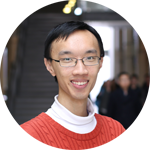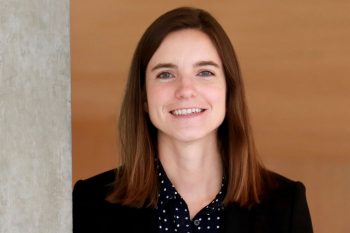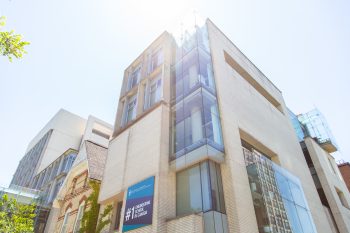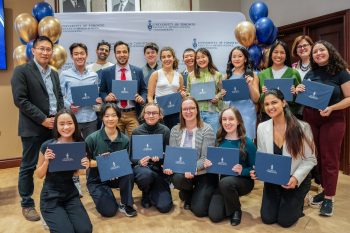Whether they are increasing student engagement or providing opportunities to work across disciplines, these U of T Engineering graduate students aim to improve engineering education both in Canada and around the world.
Kirstin Newfield (CivE PhD candidate) and Alan Fong (MIE MASc candidate) are enrolled in the Collaborative Program in Engineering Education (EngEd). Launched in 2014, the EngEd program allows master and doctoral students from either U of T Engineering or the Ontario Institute for Studies in Education (OISE) to join the small community of scholars immersed in research and learning at the nexus of education and engineering practice. The program is the first of its kind in Canada.
Students apply to the program through their home departments, but are brought together at a weekly seminar course where they share ideas and discuss theoretical foundations, methods and topics related to engineering education. Students also take a core course that introduces them to engineering learning, knowledge, assessment, and culture and community.
“Our educational methods need to evolve to meet society’s changing needs — we can’t hope to educate the engineers of tomorrow using the teaching approaches of yesterday,” says Professor Greg Evans (ChemE), director of the EngEd program. “The EngEd program builds on the innovative work that many professors from U of T Engineering and OISE are already doing, and will help us find and shape tomorrow’s best practices.”
 Kirstin Newfield (CivE MASc 1T4, CivE PhD candidate): Cross-disciplinary collaboration in sustainable urban design
Kirstin Newfield (CivE MASc 1T4, CivE PhD candidate): Cross-disciplinary collaboration in sustainable urban design
Newfield believes engineering students should embrace opportunities to work across disciplines — especially those outside of engineering — while they’re still in school.
The belief comes in part from her own experience working in an engineering consulting company, where she encountered architects for the first time. She was surprised to discover just how differently engineering graduates and architects thought about urban design.
“Architects tend to be more focused on creative expression, whereas engineers have a more pragmatic approach to design,” she says. “I wanted to study the relationship between engineers and architects at the early stages of their professional development, and see how we can connect them sooner.” Under the supervision of Professor Jennifer Drake (CivE), Newfield is creating a project-based course that would provide civil engineering and architecture students with opportunities to work together at the graduate level.
Newfield says that her favourite thing about the EngEd program is the APS 1206 Engineering Education Seminar course. “I feel like I’ve been able to connect with a lot of different people who have similar interests,” she says. “We are a select few, so being able to exchange ideas once a week is very helpful and creates a supportive community.”
Through the EngEd program, Newfield met people who are collaborating with her on another project focused on engineering education in developing countries. “Many of the world’s fastest-growing cities are in the developing world and will require a significant increase in engineering talent to accommodate this growth,” she says. “Engineering education will have to be reimagined to meet this growing demand in limited-resource settings.”
The project is still in the formative stages, but Newfield and her teammates are discussing ideas for how online education could help address the need for engineering training. Another focus of the project is to incorporate sustainability principles. “If fast-growing cities are built with sustainability in mind, we have the chance to prevent what we see in the developed world, which is cities with a large legacy of energy-inefficient infrastructure,” she says.
 Alan Fong (CompE 1T3, MIE MASc Candidate): Gamification in the classroom
Alan Fong (CompE 1T3, MIE MASc Candidate): Gamification in the classroom
Fong aims to increase student engagement with undergraduate lectures by leveraging the trend of “gamification,” which involves adding fun elements derived from video games — like point scoring or competition — to daily life.
Many popular smartphone apps make use of gamification to encourage activities that might otherwise feel like work, from physical fitness to learning a new language. Fong believes that gamification can also help address the culture shock many students experience in their first year of university.
In addition to his computer engineering degree from U of T, Fong holds a bachelor of education and spent a year teaching high school physics and mathematics for the York Region District School Board. There, he became very aware of the difference in teaching styles between secondary and post-secondary education institutions.
“In high school, we check homework and make sure students are studying for tests,” says Fong. “In contrast, many university courses have only two summative evaluations: the midterm test and the final. It’s very easy for students to put off studying, then cram just before the test.” Unfortunately, this approach does not lead to good retention of concepts.
Fong thinks one way to keep students engaged on a regular basis is to look at how they are rewarded for class participation. “Marks are one kind of currency,” he says. “I wonder if it’s possible to create another type of currency.”
For example, Fong knows a professor who uses “learning bucks” as a reward for asking questions in class or otherwise actively participating. Learning bucks can be spent on a larger self-made aid sheet for the midterm, or to waive the class’s one-day-late penalty.
Fong plans to use MIE 242 Psychology for Engineers, taught by his supervisor Professor Mark Chignell (MIE), as a testing ground for his gamification ideas. “We want to create a framework that other instructors can use, regardless of what they teach,” says Fong. “We hope it will provide them with a new tool to keep students more engaged with the material.”



